Barrie Kosky have been named the laureate of the Antonín Dvořák Prize for 2024 by the Academic Council. Australian theatre and opera director has presented Czech operas in many opera houses abroad over his long international career. His productions include Rusalka (Komische Oper Berlin), The Cunning Little Vixen (Bayerische Staatsoper), and Katya Kabanova (Salzburg Festival). The audiovisual recording of the Salzburg production of Katya Kabanova, performed by the Vienna Philharmonic conducted by Jakub Hrůša, won a 2024 International Classical Music Award, was selected as Gramophone Magazine’s Critics’ Choice 2023, and won the 2024 Gramophone Awards in the “Opera” category.
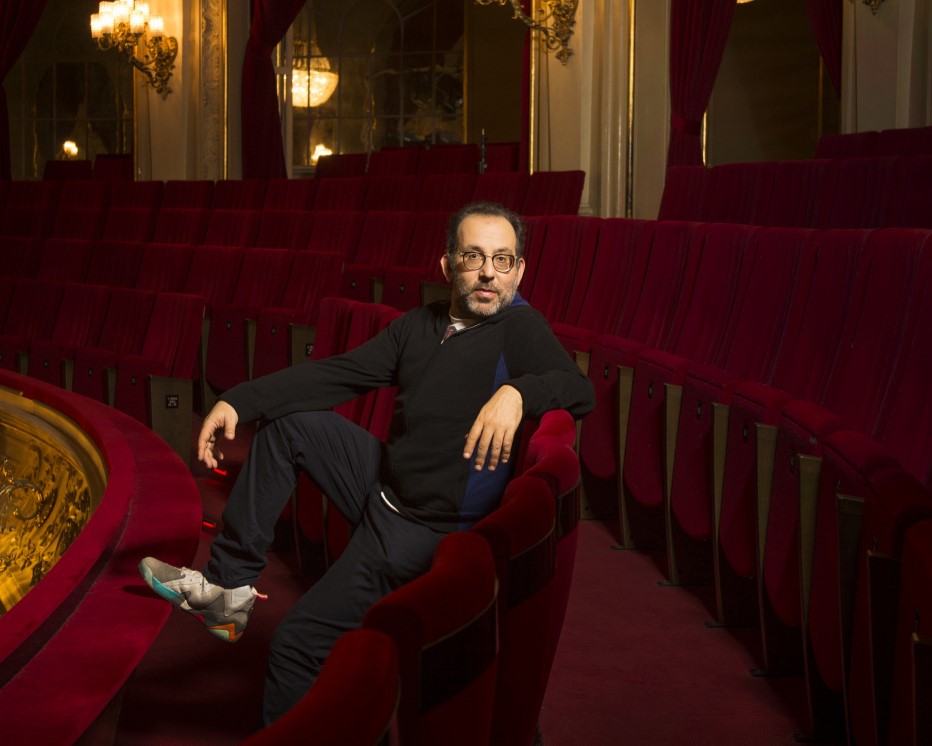 The Prague Philharmonia PKF concert featuring conductor Marc Albrecht and soloists Kateřina Kněžíková, Katharine Mehrling, Jarmila Vantuchová and Peter Berger, which will take place on 9 December 2024 in the Spanish Hall of Prague Castle, is a special occasion during which the 2024 Antonín Dvořák Prize will be awarded to Barrie Kosky. The concert programme features a cross-section of Barrie Kosky’s lifelong artistic achievements. The prize is presented each year to individuals or institutions which have spread the legacy of Antonín Dvořák and promoted Czech music in a significant way.
The Prague Philharmonia PKF concert featuring conductor Marc Albrecht and soloists Kateřina Kněžíková, Katharine Mehrling, Jarmila Vantuchová and Peter Berger, which will take place on 9 December 2024 in the Spanish Hall of Prague Castle, is a special occasion during which the 2024 Antonín Dvořák Prize will be awarded to Barrie Kosky. The concert programme features a cross-section of Barrie Kosky’s lifelong artistic achievements. The prize is presented each year to individuals or institutions which have spread the legacy of Antonín Dvořák and promoted Czech music in a significant way.
Principal patron

Concert partner

Organized by

With the kind support of

Broadcasted and recorded by

The Antonín Dvořák Prize is a prestigious award in the field of classical music. It is intended to highlight people, artistic collectives, or institutions for exceptional artistic achievements or significant merit in promoting and popularising Czech classical music in the Czech Republic and abroad. Winners have been announced by the Academy of Classical Music since 2009.
The first laureate of the prize was the great-grandson of the composer Antonín Dvořák, the violinist, violist, and conductor Josef Suk. Following him were such figures as the pianist Ivan Moravec, the cellist Yo-Yo Ma, and the world-famous choreographer and dancer Jiří Kylián. In the past, the importance of the prize has been underscored by the special places and occasions of its presentation. The soprano Ludmila Dvořáková received the Antonín Dvořák Prize in the Spanish Hall of Prague Castle during a recital by the pianist Lang Lang, the conductor Jiří Bělohlávek was given the prize in 2014 at Carnegie Hall in New York, and the Czech Philharmonic received it at its concert celebrating 100 years of Czech statehood at the Kennedy Center in Washington.
Laureates of the Antonín Dvořák Prize receive a glass sculpture of a cello designed by the architect Jiří Pelcl and produced by the glassmakers from the company Moser.
The awarding of the Antonín Dvořák Prize is governed by a charter. You can download the charter in its full wording here.
Since 2012, the Academic Council has made the decisions on awarding the Antonín Dvořák Prize. The Academic Council consists of important figures of Czech cultural life and classical music, and it decides on nominations and the actual selection of winners of the Antonín Dvořák Prize.
Panocha Quartet (2023)
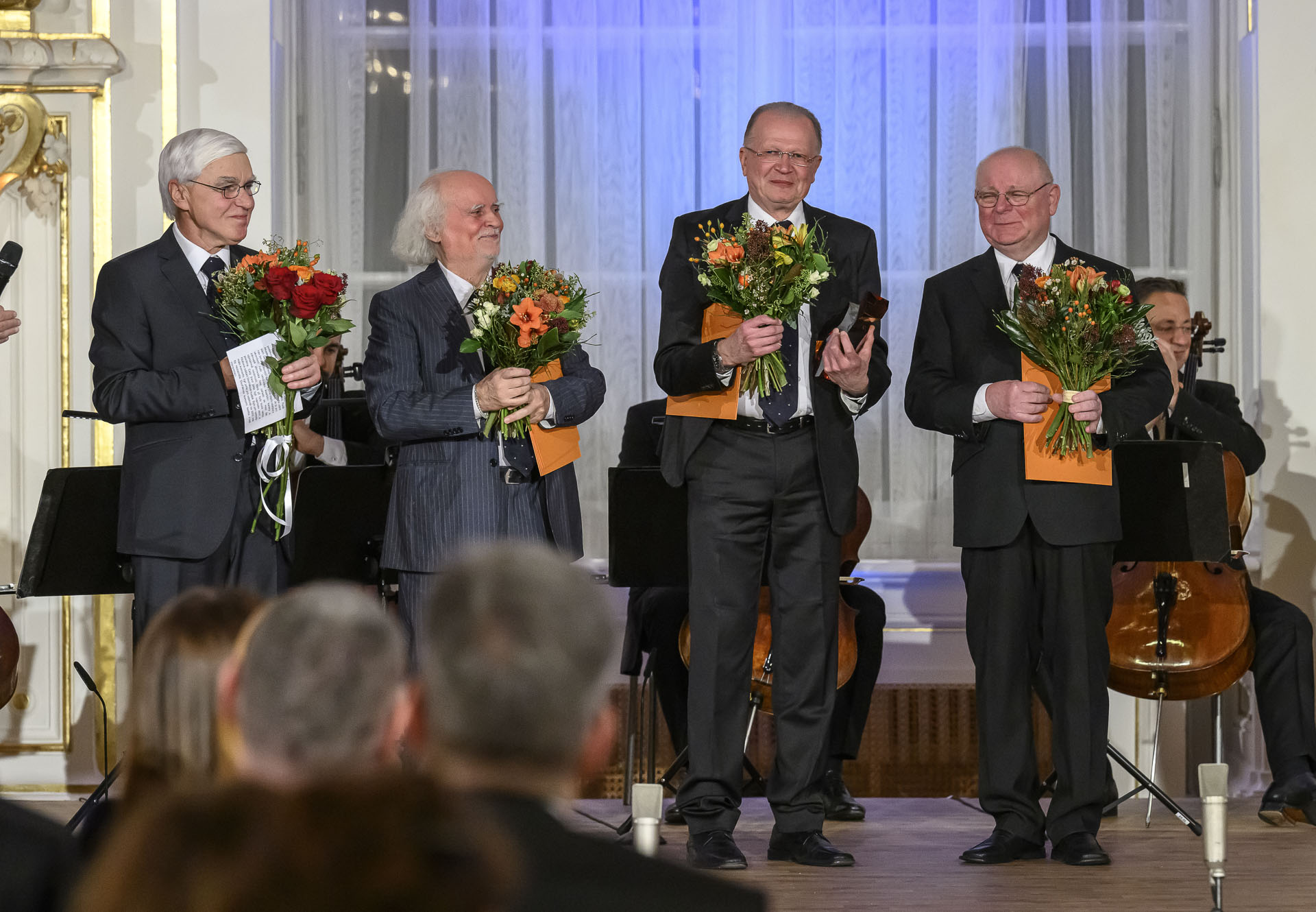
The legendary Panocha Quartet are one of the greatest representatives internationally of the Czech school of quartet playing. Over the years, they have made appearances in concert halls in practically every country of Europe, as well as in the USA, Canada, Mexico, Thailand, Iraq, Israel, Japan, Cuba, Australia, and New Zealand, in addition to their many concerts in this country. They have performed repeatedly at international music festivals (Prague Spring, Edinburgh, Salzburg, Dubrovnik, Tel Aviv, Mondsee). They have made countless recordings, including the reference recording of Antonín Dvořák’s complete string quartets and quintets. Their exceptional artistry has earned them a number of important awards including both a Gold Disc and Platinum Disc from Supraphon, the Grand Prix de l’Académie Charles Cros in Chézy-sur-Marne, and a MIDEM Classical Award in Cannes.
The Prague Philharmonic Choir (2022)
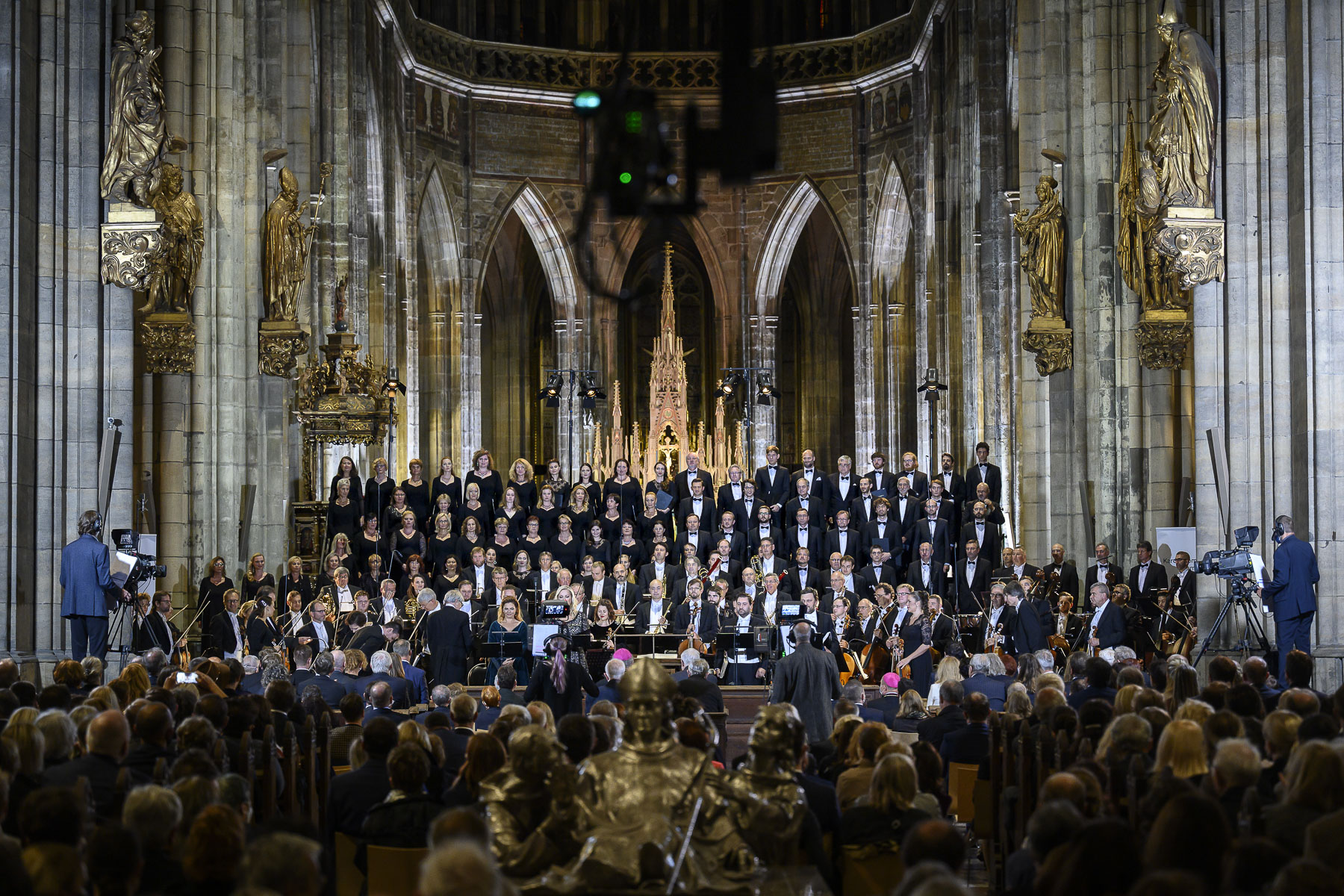
The Prague Philharmonic Choir is the oldest Czech professional choir with an unbroken history since 1935. It began its career under the leadership of its founder, singer and choirmaster Jan Kühn, as the Czech Choir. In the 1960s, already under the name of the Prague Philharmonic Choir, the choir undertook major tours around Europe, and in the 1970s it performed for the first time in Japan. In the 1980s, several internationally acclaimed recordings were made, including Antonín Dvořák’s Stabat Mater and Requiem with conductor Wolfgang Sawallisch and the Czech Philharmonic. In March 2007, choirmaster Lukáš Vasilek was appointed to lead the choir, under whose leadership the choir has established itself as a highly valued partner of world orchestras. This is evidenced by numerous performances with the Berlin Philharmonic and its chief conductor Kirill Petrenko, as well as collaborations with conductors such as Zubin Mehta, Alan Gilbert, Sir John Eliot Gardiner, Fabio Luisi or the late Mariss Jansons. Also, PFS has long been recording for DECCA. While the Prague Philharmonic Choir’s main partner, with which it now also shares its main organisational platform, is the Czech Philharmonic Orchestra headed by chief conductor Semyon Bychkov, the choir also collaborates with other Czech orchestras.
Sir András Schiff (2021)
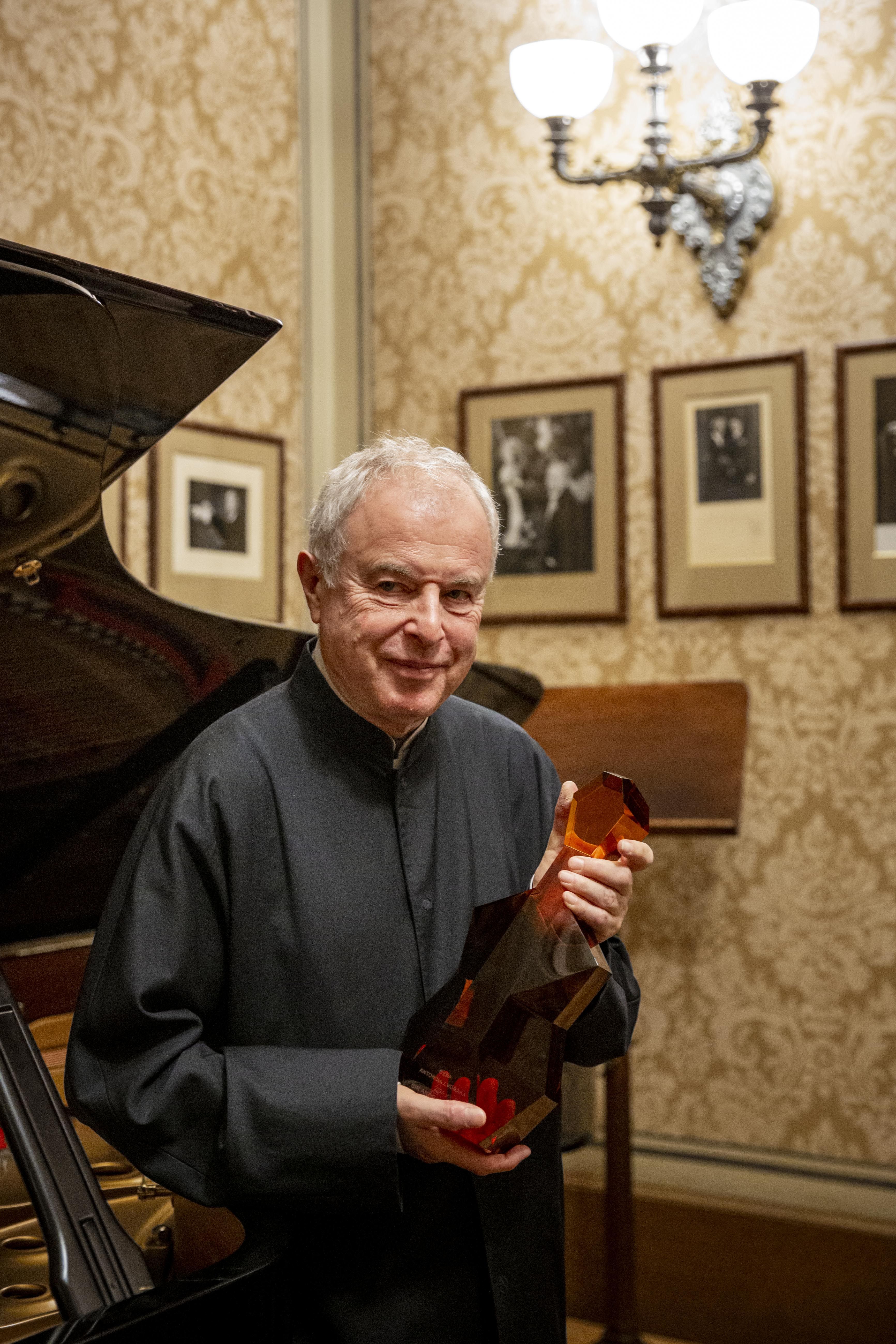
András Schiff has long been one of the most brilliantly shining stars among pianists. A native of Hungary, he lives mainly in Basel and Florence, and he is widely regarded as one of the great interpreters of the music of the Baroque, Classical, and Romantic periods, although his vast repertoire extends into the music of the 20th century as well. He is a great lover of Czech music: his recordings for the ECM label include most of Leoš Janáček’s piano music, he frequently performs the chamber works of Antonín Dvořák, and he also instigated and financially supported the publication of a facsimile edition of Dvořák’s Piano Concerto in G minor. Schiff appears regularly on all of the world’s important stages, and he has an enormous discography to his credit including complete sets of the Mozart, Beethoven, and Schubert piano sonatas. He teaches masterclasses at prestigious music schools, and he has also enjoyed success as a conductor. For his artistic activities, he has won countless awards, including a Grammy, a Gramophone Award, and the Order of the British Empire.
Jakub Hrůša (2020)
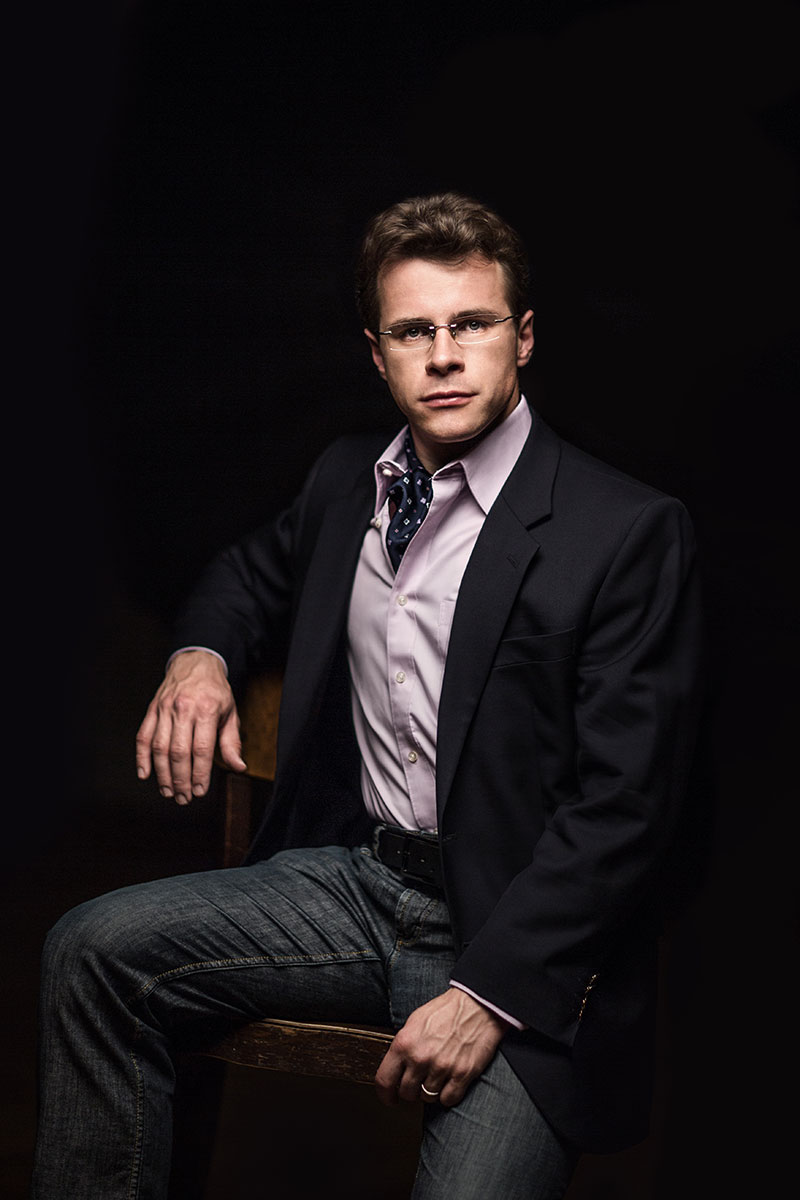
Jakub Hrůša is one of the most active and influential representatives of Czech musical culture and of the Czech school of conducting around the world. He regularly conducts top orchestras in Europe and the USA. He is currently the chief conductor of the Bamberg Symphony and the principal guest conductor of the Czech Philharmonic and of the Philharmonia Orchestra in London. From 2009 to 2015 he served as the music director and chief conductor of the PKF − Prague Philharmonia. Among his most important engagements have been repeated invitations from the Vienna Philharmonic, the Berlin Philharmonic, the New York Philharmonic, the Orchestre de Paris, the Leipzig Gewandhaus, and the Bavarian Radio Symphony Orchestra. He guest conducts regularly at the BBC Proms, and awaiting him in the coming season is his Salzburg Festival debut. Maestro Hrůša has an equal affinity for the concert repertoire and opera. He appears regularly as a guest at the opera festival in Glyndebourne and with the Vienna State Opera, London’s Royal Opera, the Opéra national de Paris, and the Frankfurt Opera, while appearing occasionally at Czech opera houses as well. For his recording of compositions by Dvořák and Martinů and for a DVD recording of the opera Vanessa at the festival in Glyndebourne, he recently won a BBC Music Magazine Award. His active interest in the composer Josef Suk, Antonín Dvořák’s son-in-law, has been reflected in his activity with this year’s Dvořák Prague Festival and the subsequent season of the Czech Philharmonic. Suk’s complete orchestral music is now his priority recording project. A common denominator of his activity abroad has been his steadfast promotion of the music of Czech composers in particular. For this activity, the Academy of Classical Music has awarded him the 2020 Antonín Dvořák Prize.
Gabriela Beňačková (2019)
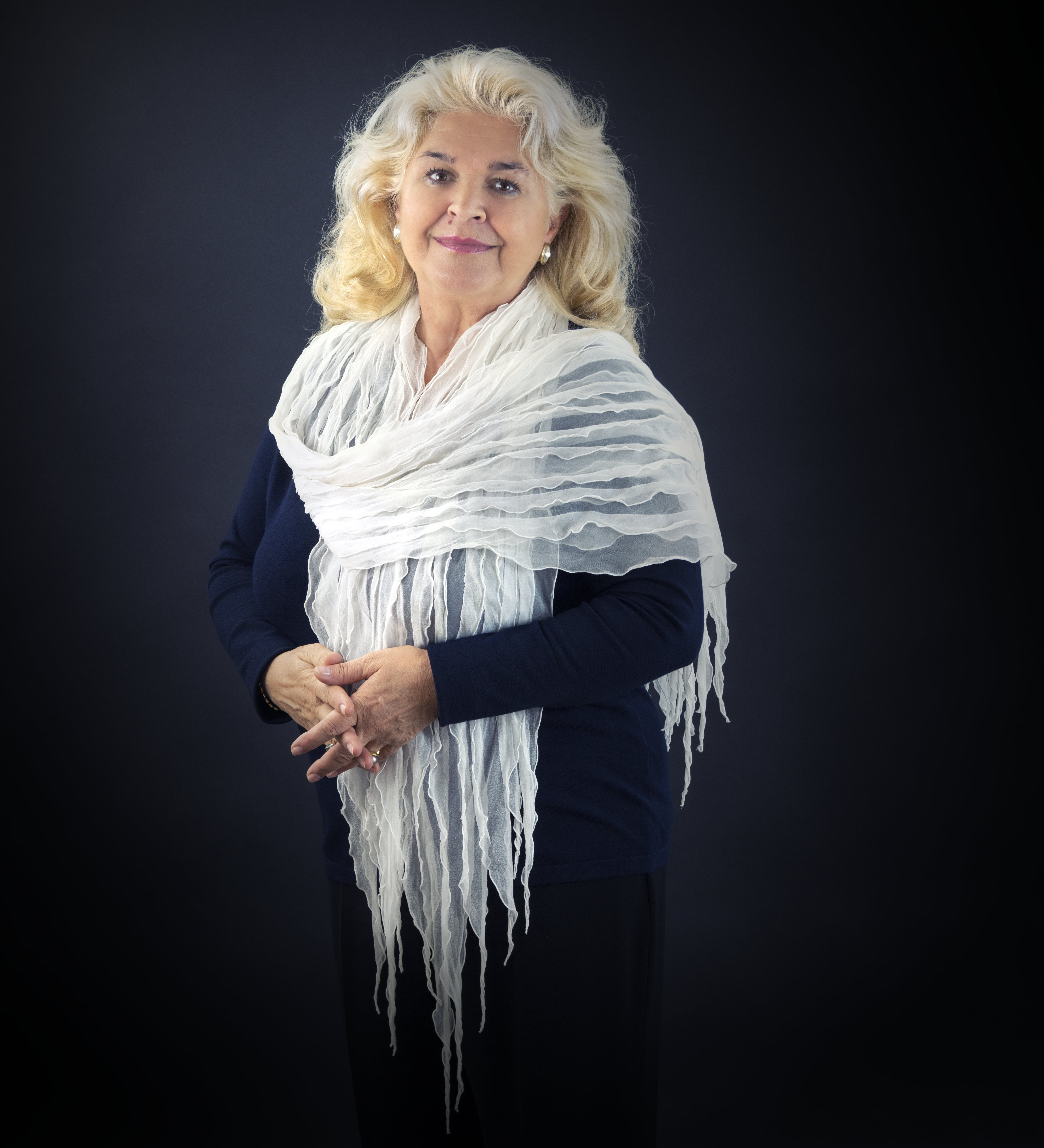
A bright, lyrical soprano voice with a tinge of Slavonic sadness that rises to the heights with incredible lightness – that is how one might typically describe the voice and singing of Gabriela Beňačková, whose vocal career is one of the most brilliant to have emerged from Slovakia when it was still part of a country shared with the Czech people. Around the world, Ms. Beňačková is the definitive performer of the role of Mařenka in The Bartered Bride, of major female roles in the operas of Leoš Janáček, and of the title role in Dvořák’s Rusalka. Her recording of The Bartered Bride under the baton of Zdeněk Košler is regarded as the key to the modern interpretation of Bedřich Smetana’s most popular opera. Besides Beňačková and the Slovak tenor Peter Dvorský singing the role of Jeník, the recording also features the bass Richard Novák and the Czech Philharmonic, two subsequent winners of the Antonín Dvořák Prize in 2016 and 2018. Gabriela Beňačková was born on 25 March 1947 in Bratislava, and she devoted herself to music from her childhood. She sang in the Czechoslovak Radio Children’s Choir in Bratislava, and later she studied singing at the conservatoires in Bratislava and Žilina and at the Academy of Performing Arts in Bratislava. She became a member of the opera ensemble at the National Theatre in Prague in 1975. She soon worked her way upwards and became a leading member of the ensemble, but in parallel to her successes at home, she was also on the fact track to a big career abroad. Ms. Beňačková became an ensemble member at the Bavarian State Opera and the Vienna State Opera, where one of her major roles was Maddalena in the opera Andrea Chénier. Plácido Domingo sang the title role, and Ms. Beňačková made an outstanding vocal pairing with him. Together, they also created the roles of Otello and Desdemona in Giuseppe Verdi’s opera, which they performed many times at the Metropolitan Opera, where Ms. Beňačková also gave remarkable performances of Káťa Kabanová. She later recorded this Janáček opera under the baton of Charles Mackerras. At the Metropolitan Opera, the Vienna State Opera, and other important theatres, Ms. Beňačková has made her mark as a moving performer of the title part in Dvořák’s Rusalka. She has been recorded twice in the role, once with the Czech Philharmonic and once in Vienna. Václav Neumann conducted on both recordings, and on the first of them, Beňačková again joined forces with Richard Novák in the role of the Water Goblin. Ms. Beňačková also appeared in Neumann’s complete set of recordings of the symphonies of Gustav Mahler. She has sung the soprano parts in Dvořák’s Requiem and Stabat Mater and has made recordings under the baton of Wolfgang Sawalisch. Ms. Beňačková has been appreciated not only in the Czech and Slovak repertoire; she has been simply outstanding singing lyric roles. She has sung Mimi in Puccini’s La bohème and Margeurite in Gounod’s Faust and Boito’s Mefistofele. Her partners were the world’s top singers of the 1970s through the ’90s. In about 1997 she began to withdraw from her life as a performer, and it seemed that her career as a singer had definitively ended, but in 2012 she appeared at the Salzburg Festival as the Countess de la Roche in Bernd Alois Zimmermann’s opera Die Soldaten. In 2018 she surprisingly played the role of Kabanicha in Janáček’s Káťa Kabanová – the public at the Teatro San Carlo in Naples saw Ms. Beňačková as Káťa’s tyrannical mother-in-law. The album of songs by Dvořák, Janáček, and Martinů, which she recorded in 1994 with the pianist Rudolf Firkušný, was nominated for a Grammy. At present, she is the president of the Gabriela Beňačková International Vocal Competition. She has earned the title of Kammersängerin with the Bavarian State Opera and Vienna State Opera, and she has been awarded the Medal of Merit and the Order of the White Double Cross. She has won the Antonín Dvořák Prize as an outstanding artist who is still active.
Czech Philharmonic (2018)

This outstanding orchestra is becoming a laureate of the Antonín Dvořák just as Czech are commemorating the 100th anniversary of the founding of Czechoslovakia as an independent state. The Academy of Classical Music, which awards the prize, decided to take an unusual step on the occasion of this anniversary: a prize intended primarily for individuals will be granted to an institution for the first time. The Czech Philharmonic is receiving this award at a time when Semyon Bychkov has begun serving as its chief conductor. Together with him, the orchestra will be receiving the Antonín Dvořák Prize at the Kennedy Center in Washington, D.C., where one of the important concerts of this year’s American tour is taking place. The programme primarily features the music of Antonín Dvořák. Dvořák conducted the first concert of the Czech Philharmonic, which took place on 4 December 1896. Today, the conductor of the first concert of the leading Czech orchestra would be looking on with satisfaction at how the Czech Philharmonic is performing to acclaim in the worlds greatest concert halls. With its previous chief conductor Jiří Bělohlávek, the prestige of the Czech Philharmonic grew in part thanks to recordings of the complete Dvořák symphonies for the Decca label. The orchestra also has big plans together with Semyon Bychkov: from the complete Mahler symphonies to a series of new works commissioned from contemporary composers. In 2018, the Czech Philharmonic is becoming a laureate of the Antonín Dvořák Prize as the institution that sets the highest standards for the Czech school of musical performing.
Ivan Klánský (2017)
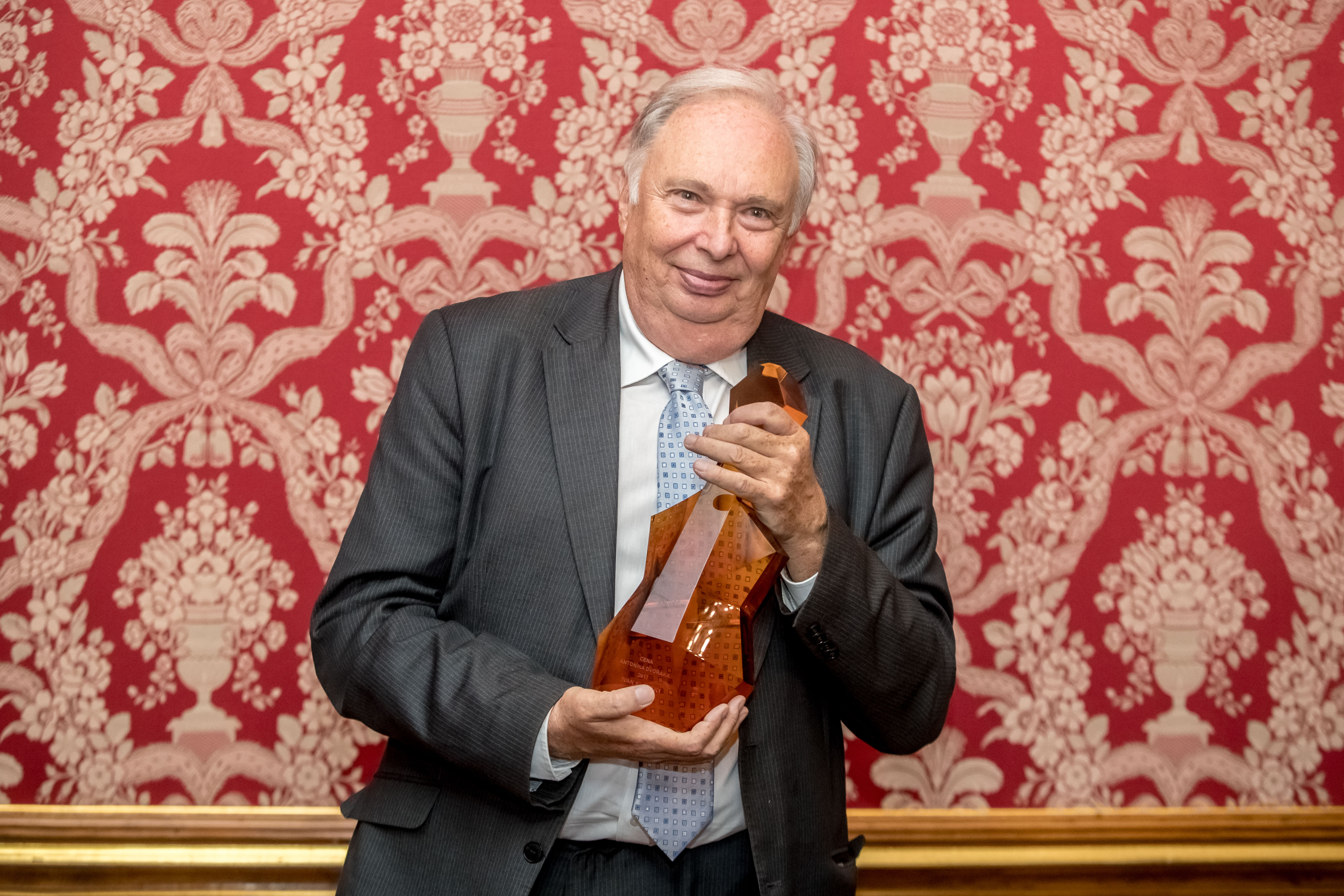
The pianist Ivan Klánský is emotionally systematic, to put it briefly. His playing naturally combines a systematic approach with powerfully radiant emotion. Now seventy years old, Mr. Klánský regards the balance of these two elements as very important: to him, the ability to formulate emotion comprehensibly is fundamental both for the artist and for the teacher. And he also sees this balance in his most accomplished pupils Ivo Kahánek and Martin Kasík. Klánský studied piano at the Prague Conservatory under the wonderful pianist Valentina Kameníková – recordings document her artistry, and stories are being told to this day about her harsh teaching methods, but Klánský did not allow himself to be dissuaded. He worked in parallel under František Rauch, and when he finished his studies with the two teachers, he was ready for his future career. He articipated successfully at competitions in Bolzano (1967), Naples (1968), Leipzig (1968), Barcelona (1970), and Warsaw (1970). At the International Chopin Piano Competition, he became the first and still the only Czech to reach the finals. Chopin would remain the love of his life, and in 1992 Klánský became the chairman of the Fryderyk Chopin Society. Ivan Klánský’s solo repertoire consists mainly of Bach, Mozart, and Beethoven, and of the Romantics, he plays mainly Chopin and Schumann. He has also recorded the complete piano works of Bedřich Smetana, released on six CDs. Dvořák holds a special place in Mr. Klánský’s repertoire. It is rather unusual for a pianist to become a laureate of the Antonín Dvořák Prize. Ivan Klánský himself commented that Dvořák is not a typical piano composer, but he emphasised Dvořák’s chamber music in particular: “Of Dvořák’s music, his chamber works with piano are dearest to me. There are the four piano trios, the two piano quartets, and the two piano quintets, and I adore the Slavonic Dances, which Dvořák originally composed for piano four hands. I play them with my son Lukáš, and we’ve even recorded them on a CD. Dvořák was capable of using the piano to create things of beauty, although he did not write much solo piano music. He wrote a lovely piano concerto, but you couldn’t put together a full recital of just his solo pieces. But his chamber music is all the more beautiful, and those pieces are among my favourites in the entire repertoire.” Ivan Klánský is currently the dean of the faculty of music at the Academy of Performing Arts in Prague, and he is still intensively engaged in giving concerts – both as a soloist and with the famed Guarneri Trio Prague, of which he is a member. He became a laureate of the Antonín Dvořák Prize in 2017.
Richard Novák (2016)
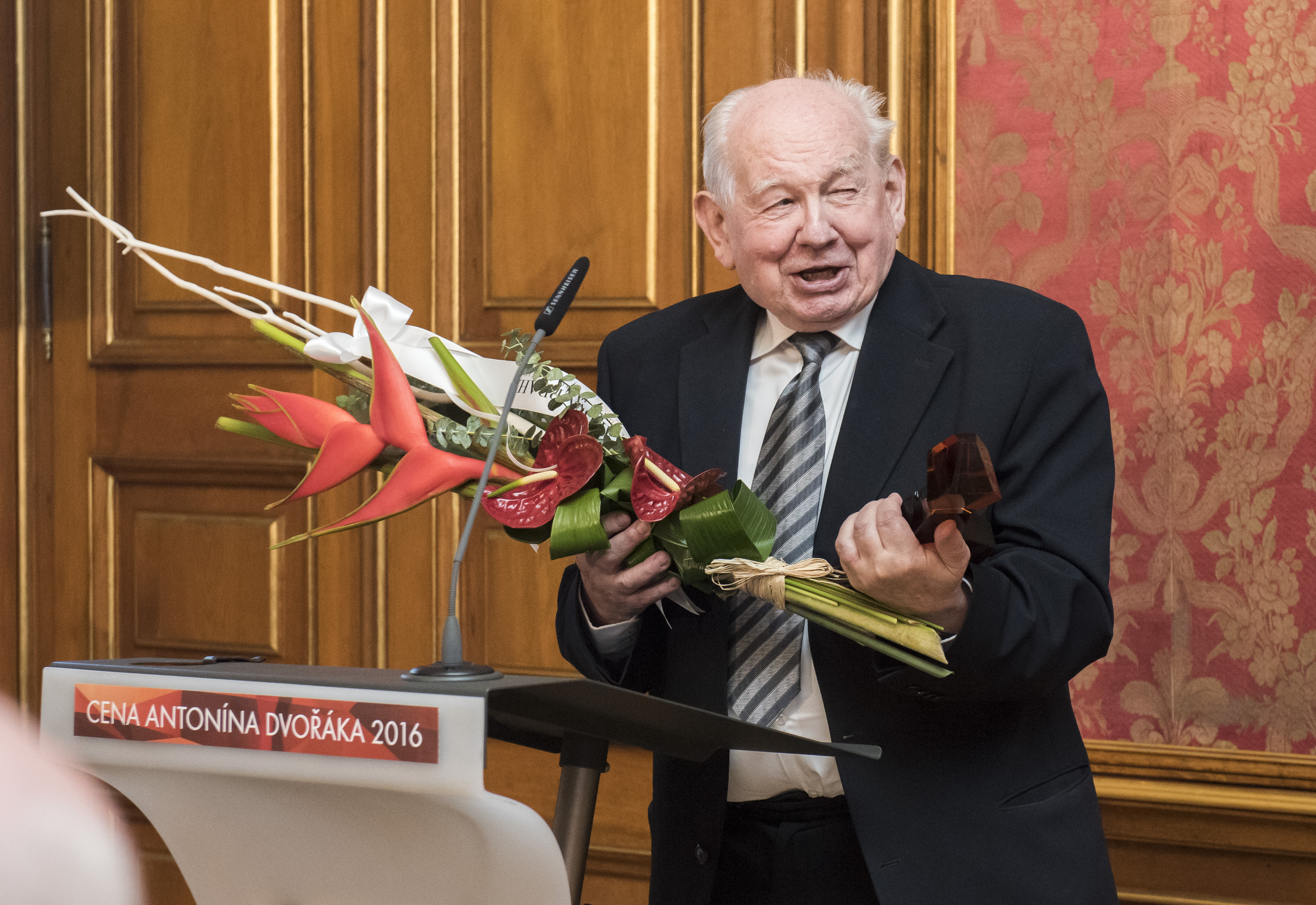
Richard Novák (2016) Receiving the Antonín Dvořák Prize is the most beautiful thing that could have happened to me, said the bass Richard Novák in an attempt to describe his feelings. The year was 2016, and the singer was celebrating his 85th birthday – not quietly at home, but on the concert stage. After all, his career was far from over. At his birthday celebration, Richard Novák joked that he didn’t need to exercise his voice anymore – just his memory. At the Smetana’s Litomyšl Festival, he gave the world premiere of the cycle Evening Songs in an arrangement for harp, and he also sang at the gala concert that concluded the festival. Richard Novák commemorated his eightieth birthday in Brno – the city in the south of Moravia where he spent most of his life. It was a magnificent celebration: on his birthday, 2 October, he sang the role of the pilgrim Ivan in Dvořák’s oratorio Saint Ludmila. A month later, he gave a recital with a full evening of lieder – Brahms and Loewe for the first half, then songs by Czech composers of the twentieth century after intermission. Both evenings were thrilling, but Saint Ludmila was perhaps more in keeping with the mood of celebration. The performance of Dvořák’s festive oratorio was by no means a mere excuse to allow a worthy old man one more appearance on stage. It was a dignified celebration of a major milestone in the great singer’s life. At the same time, it was a powerful reminder that singers can safeguard the length of their careers only by treating their voices responsibly and by having perfect technique. Paradoxically, Richard Novák is basically an amateur as a singer; after having only taken some private lessons, he was selftaught. At the Brno Conservatory he studied composition, and while he composed almost no music of his own, he had a great deal of understanding for the music of his contemporaries. A large number of composers turned to Mr. Novák when their new works did not meet with comprehension from other singers. Later on, they would come to him directly. Richard Novák often sang world premieres that perhaps no one else would have performed. Among the composers to write music for him were Zbyněk Vostřák, Josef Berg, and his uncle Jan Novák – an important Czech composer who emigrated from communist Czechoslovakia. Richard Novák kept detailed records of his appearances – he gave over 3,000 operatic performances alone. He also made a number of recordings, foremost among which are the works of Leoš Janáček and Antonín Dvořák. He has recorded Janáček’s Glagolitic Mass twice – with Riccardo Chailly for the Decca label and with Charles Mackerras for Supraphon. He still enjoys recalling some of the moments from his career of 64 years. Like singing Dvořák’s cantata The Spectre’s Bride in the 1980s at the opera in Munich with Wolfgang Sawallisch. Or his participation in the first recording of the oratorio Saint Ludmila in 1964.
Yo-Yo Ma (2015)

Born to Chinese parents in France, Yo-Yo Ma attended school in New York and studied at the Julliard School and Harvard. He is known all around the world. Today, the cellist Yo-Yo Ma is one of the most famous figures of the music world, which he does not divide into classical and popular – genres are meaningless to him. He plays Dvořák’s Cello Concerto with the same naturalness as American bluegrass, Chinese folk music, or the Argentine tango. He moves us as a musician and as a person – to him, music is a means of communication and of understanding between peoples. Since 2006, Yo-Yo Ma has been a United Nations Messenger of Peace. When Yo-Yo Ma received the Antonín Dvořák Prize in 2015, he said the following: “Dvořák didn’t compose music for the sake of music as such or for the sake of art; he wrote it for life. That’s how it seems to me.” So Dvořák’s Cello Concerto suddenly ceases to be just an opportunity to shine as a soloist in a popular, beautiful composition. Yo-Yo Ma has laid claim to the ideological foundations upon which Dvořák erected his masterpieces. Yo-Yo Ma is more than just a soloist – regardless of his being a top-calibre musician. He is also an ambassador of the arts, which receive less and less time and resources in a world that focuses on performance and profits. His aim is for schools to devote just as much attention to arts education as to technical and scientific fields. Success in that effort might mean more to Yo-Yo Ma than all of the awards he has received, whether the National Medal of Arts, the Presidential Medal of Freedom, the Polar Music Prize, or any of his 18 Grammy Awards. More than just a musician, Yo-Yo Ma is also engaged as a citizen: he played at the first reading of the names of the victims of the attack on the World Trade Center and at the interfaith worship service for victims of the Boston Marathon bombing. He was an advisor to President Barrack Obama, and in March 2016 he was appointed as Artistic Advisor at Large to the Kennedy Center. Thanks to his popularity, Yo-Yo Ma even appeared in the episode Puffless, Mr. Burns of the comedy series The Simpsons. Yo-Yo Ma first appeared in Prague in the spring of 1989: with the conductor Václav Neumann and the Czech Philharmonic he played Dvořák’s Cello Concerto. He played the same concerto in Prague twenty-six years later at the Dvořák Prague Festival. Conducting the Czech Philharmonic was Jiří Bělohlávek, whom Yo-Yo Ma succeeded as the next laureate of the Antonín Dvořák Prize.
Jiří Bělohlávek (2014)
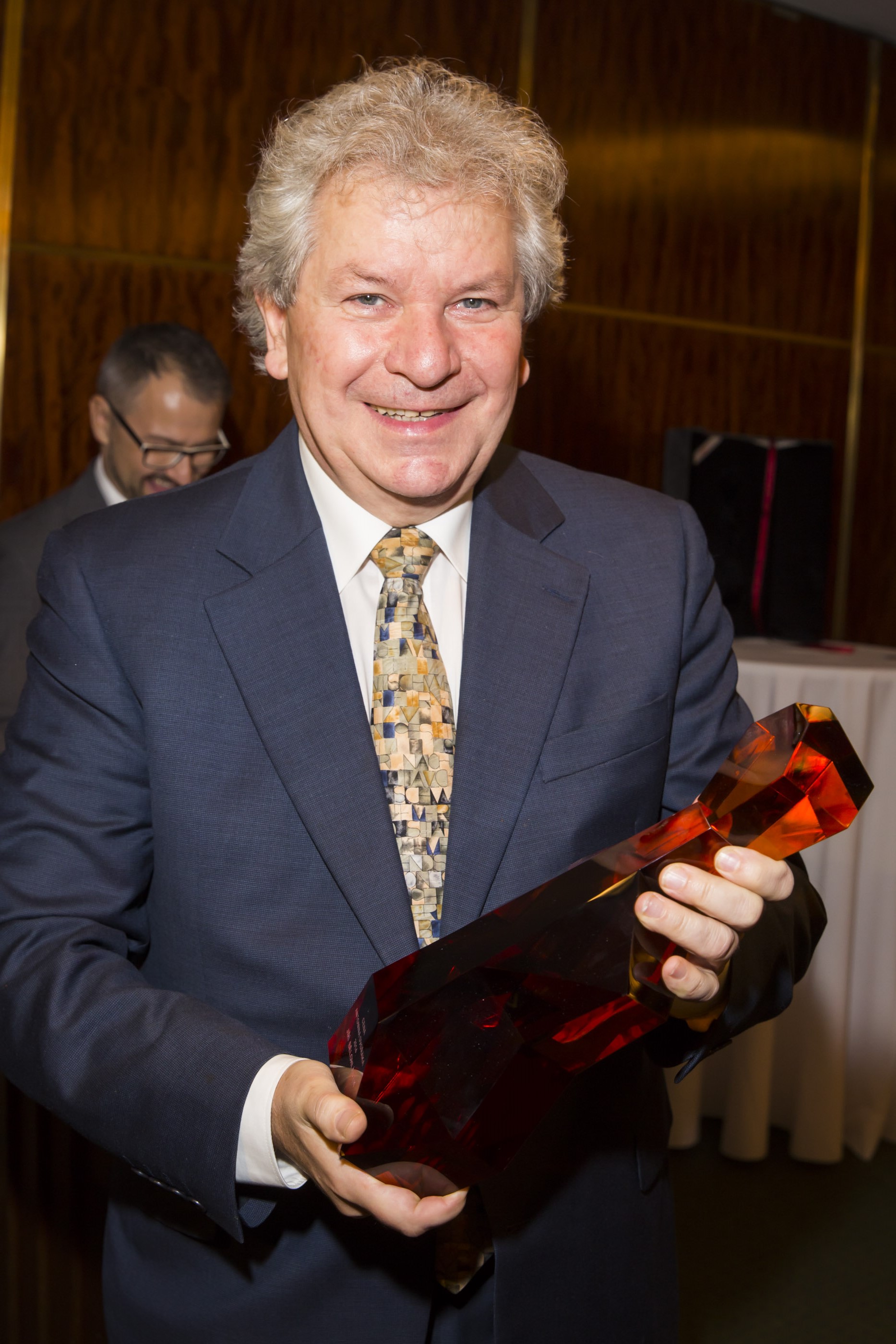
The conductor Jiří Bělohlávek was an ambassador of Czech music, although no one ever officially conferred such a title on him. The Antonín Dvořák Prize was rightly his before he received it in 2014, and perhaps even before the prize was established. Dvořák’s works were among those that Jiří Bělohlávek took with him everywhere he went, and he tended to give them priority. And it did not matter at all whether he happened to be the chief conductor of the Czech Philharmonic or of the BBC Symphony Orchestra at the time, or whether he was conducting at the Metropolitan Opera, the Vienna State Opera, the Glyndebourne Festival, or the National Theatre in Prague. Mr. Bělohlávek was a meditative lyricist who put together functional wholes from subtly refined details. And those wholes were cohesive and impressive, as anyone can ascertain from hearing the complete set of Antonín Dvořák’s symphonies, which he recorded with the Czech Philharmonic for the Decca label. The process of recording the complete set of symphonies was captured in a documentary film by the Canadian director Barbara Willis Sweete, whose directing credits also include 31 broadcasts from the series The Metropolitan Opera HD Live. Her documentary Sketches of Dvořák brought the great Czech composer and American culture together in yet another way, and Jiří Bělohlávek has one of the major roles in the film. Like Arturo Toscanini, Bělohlávek had originally been a cellist. He studied conducting at the Prague Conservatory and the Academy of Performing Arts, and he received training and great creative inspiration from a master, the legendary conductor Sergiu Celibidache. “He taught me – or actually showed me – how I did nothing. How I was not able to do anything, that I did not know how to study, how superficially I viewed the conductor’s role, and how laughable and superficial my penetration of the score was,” said Bělohlávek recalling Celibidache’s influence, and he added “It wasn’t a very pleasant thing to find out, but it led me to make a transformation. I began working in an absolutely different way.” Jiří Bělohlávek served two terms as the chief conductor of the Czech Philharmonic. The first was from 1990 to 1992, then he left after disagreements with the orchestra. His return in 2012 was an anticipated and welcome event, and the present executive director of the Czech Philharmonic David Mareček regards it as one of his greatest successes. Under Mr. Bělohlávek’s artistic leadership, the Czech Philharmonic won back its worldwide renown. It made recordings for the Warner Classics, Decca, and Deutsche Grammophon labels. Maestro Bělohlávek was a Commander of the Order of the British Empire and the recipient of many other awards. Jiří Bělohlávek received the Antonín Dvořák Prize in 2014 before a concert with the Czech Philharmonic at New York’s Carnegie Hall.
Jiří Kylián (2013)
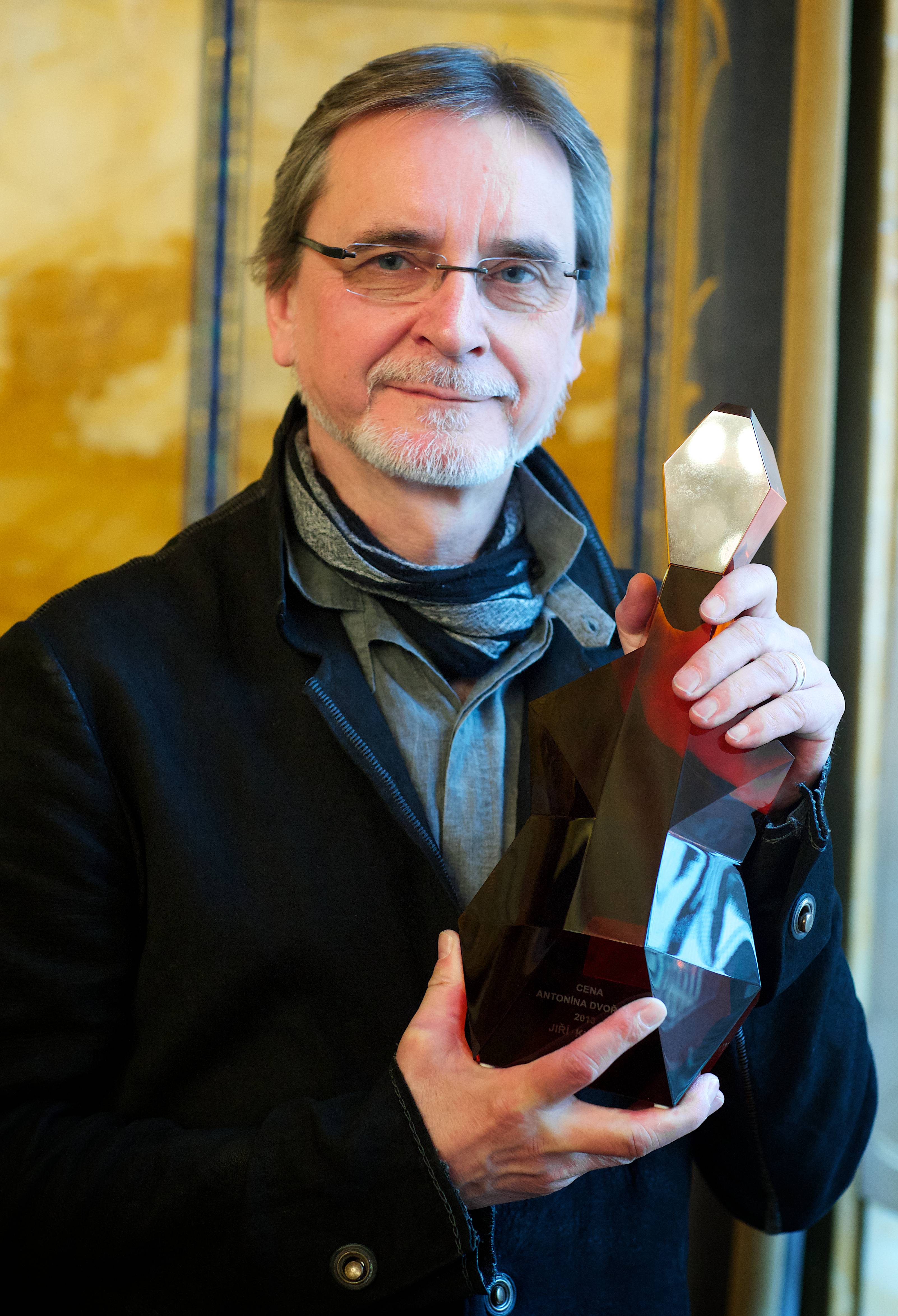
Forgotten Land, Falling Angels, Petite Mort – if the choreographer and dancer Jiří Kylián had created nothing apart from those three productions, his contribution to theatre of movement would nonetheless be normous. The Antonín Dvořák Prize, which he received in 2013, was the climax of a long series of awards that he has earned throughout a career that he is still continuing successfully. Jiří Kylián began dancing at the age of nine in Prague. He continued with dance at the conservatory, but already in 1967 he managed to earn a scholarship to the Royal Ballet School in London. His next stop was at the Stuttgart Ballet in Germany, then under the leadership of John Cranko. Ultimately, the Dutch Dance Theatre – Nederlands Dans Theater – was to become his home stage and the most important centre of his activities. The theatre, with its focus on contemporary dance, was founded in 1959, and it gradually earned a respected position. By the early 1970s, however, growing disputes between the artistic staff and management had left the theatre in a state of uncertainty, and the quality of performances had become uneven. It was with the arrival of Jiří Kylián that this situation, which certainly had been unpleasant for everyone, came to an end. As a guest choreographer, Mr. Kylián’s first creations for the Nederlands Dans Theater were the performances Viewers, Stoolgame, and La Cathédrale Engloutie. The collaboration proved to be successful, and in 1975 Jiří Kylián became the ensemble’s artistic director together with Hans Knill. Besides his outstanding theatrical work, at the Nederlands Dans Theater Mr. Kylián also founded the group NDT II for young dancers and the group NDT III for dancers over the age of forty. Mr. Kylián’s best-known choreographies are mentioned right at the beginning. Forgotten Land (1981) tells of people, events, and reminiscences that have disappeared somewhere in the depths of time. It is musical choreography based on the Sinfonia da Requiem by Benjamin Britten; another source of inspiration was the painting Dance of Life by Edvard Munch. In Falling Angels, Mr. Kylián creates constant mutual communication between eight dancers who drive ahead to the pulsating music of Steve Reich for percussion instruments. Petite Mort was created for the Salzburg Festival for the 200th anniversary of Mozart’s death. Six men, six women, and rapiers (foils) dance to the music of Wolfgang Amadeus Mozart. Since his first work Paradox in 1970, Jiří Kyliána has created hundreds of choreographies, and the list of awards and honours Mr. Kylián has so far received is also long. He is a knight of France’s Ordre national de la Légion d’honneur, he earned the Golden Lion for Lifetime Achievement at La Biennale di Venezia, and the Queen of the Netherlands has conferred on him the Medal of the Order of the House of Orange for Arts and Science… The list goes on and on. Jiří Kylián received the Antonín Dvořák Prize as one of the most distinguished artists of the worldwide dance scene.
Ludmila Dvořáková (2012)
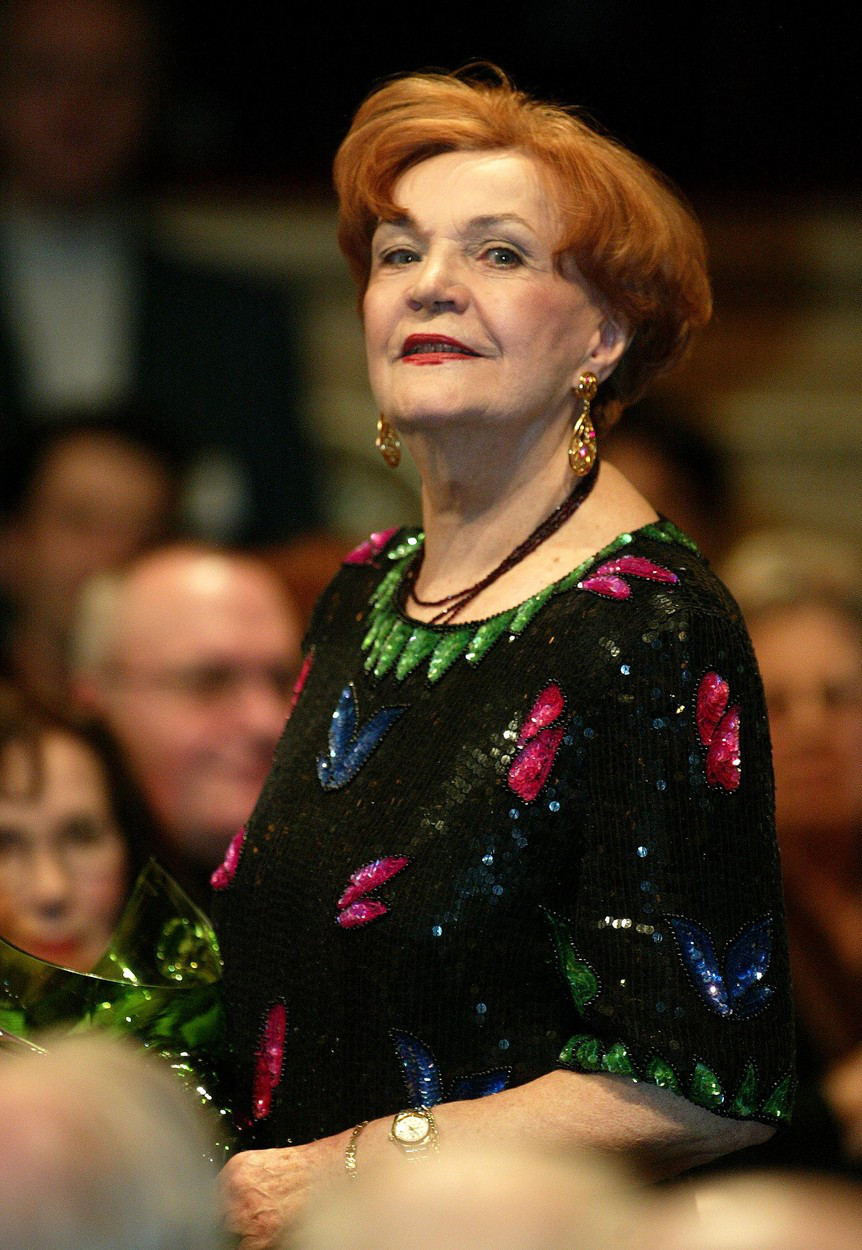
Ludmila Dvořáková was an outstanding dramatic soprano, and even her name associates her with Antonín Dvořák. Her given name reminds us of Dvořák’s monumental oratorio Saint Ludmila, and her surname reminds us of the composer himself. Ms. Dvořáková made her reputation as a heroine in the operas of Richard Wagner and Richard Strauss, singing at the Metropolitan Opera in both the old and the new building, but her repertoire also included Leoš Janáček and Czech opera in general – something no Czech singer can avoid. Dvořáková began her career in 1949 in Ostrava, then an industrial city on the border between Moravia and Silesia. Ostrava’s typical features were coal mines and steel mills – it might have reminded some people of Buffalo, New York. Smoking blast furnaces might not seem to create the ideal environment for the art of singing, but Ostrava’s opera was – and still is – of very high quality. Ludmila Dvořáková’s talent was recognised by the conductor Rudolf Vašata, who later became her husband. He heard her sing Mařenka in The Bartered Bride, and he quickly understood that there was¨far more heroism, passion, and nobility in her voice that was required for the role of the sweet girl Mařenka in Bedřich Smetana’s opera. He cast Dvořáková in the title role of Janáček’s Káťa Kabanová, starting her on a path at the summit of which stood a great soprano heroine. Ludmila Dvořáková was to become a true “Hochdramatischer Sopran”. Her voice was not only big, but also beautiful and perfectly controlled. Ludmila Dvořáková became a soloist at the National Theatre in Prague. She made guest appearances at the Vienna State Opera, but opera theatres in Germany soon noticed her artistry as well. In 1960 Dvořáková began singing at the Berlin State Opera, where one of her roles was that of the Foreign Princess in Dvořák’s Rusalka. From East Berlin, it was just a short step to the world’s biggest stages in the West – she even managed to work on the other side of the Iron Curtain with the permission of the authorities, so she was not forced to emigrate from communist Czechoslovakia. Her Ortrud in Lohengrin so captivated Wagner’s grandson Wieland that he immediately invited her to the festival in Bayreuth. At the theatre dedicated to the operas of Richard Wagner, she sang not only Ortrud, but also Brünnhilde, Venus in Tannhäuser, and Kundry in Parsifal. A Wagnerian soprano can hardly attain loftier goals. In 1966 Ludmila Dvořáková sang at the Metropolitan Opera for the first time, making appearances while the company was still in its old building. She sang the title role in Beethoven’s Fidelio, and the critics were just as enthusiastic as the public. At the Met, Ms. Dvořáková sang roles including Isolde, Ortrud, and Strauss’s Elektra – her fach was clear. At London’s Covent Garden she sang all of the big female roles in Der Ring des Nibelungen under the baton of Georg Solti, so she appeared in all four evenings of the production. But she also sang Dvořák’s Biblical Songs in London. Ludmila Dvořáková’s death was like a Wagnerian tragedy – she died in a fire at her home. She left behind more memories than recordings – she did not like making recordings. In 2002 she won the Thalia Prize for lifetime achievement, and she won the Antonín Dvořák Prize ten years later.
Jiří Kout (2011)
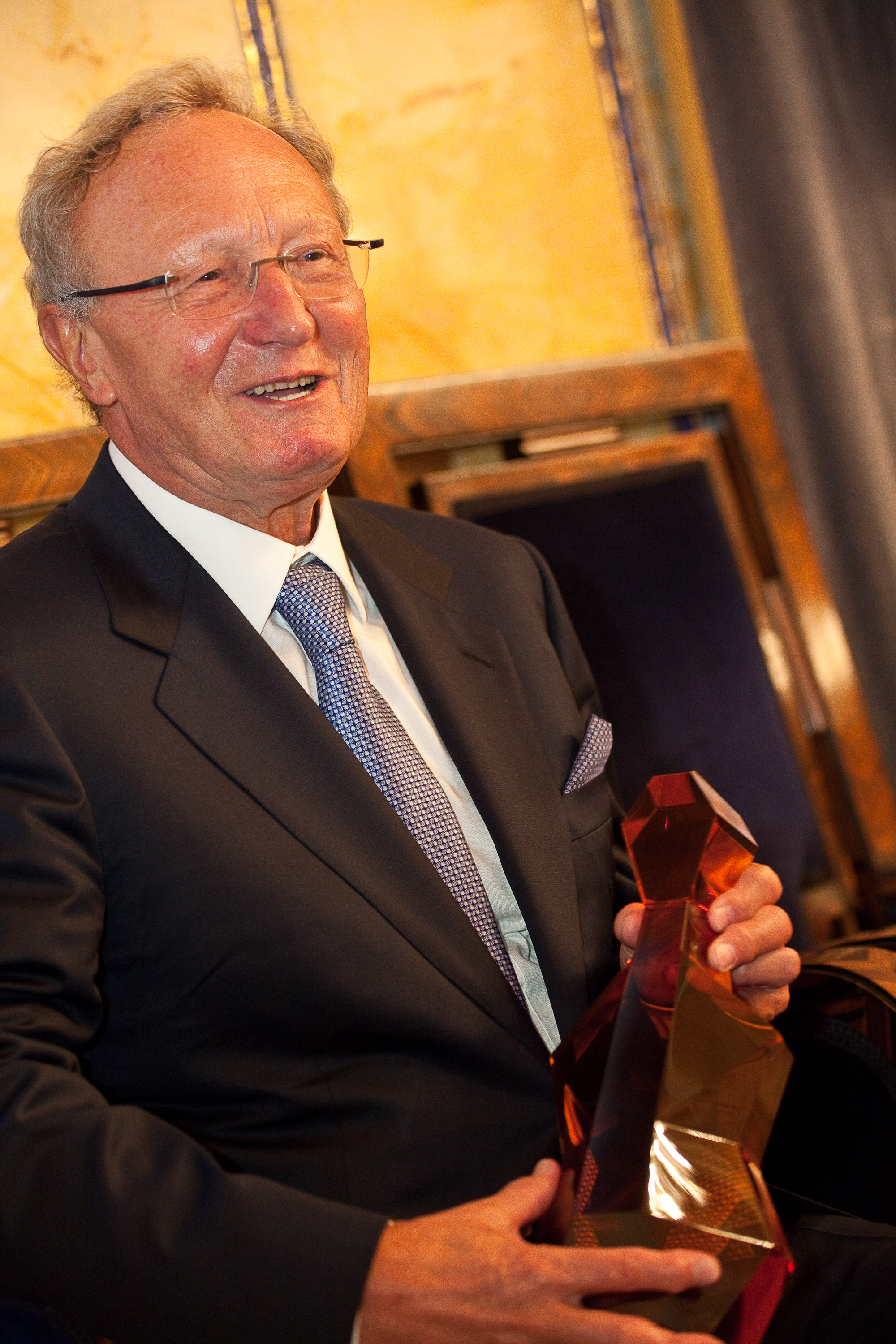
The artistic career of the conductor Jiří Kout took him from the west-Bohemian city Pilsen all the way to New York. From the post of conductor of a small regional theatre, he worked his way up over many years to the Metropolitan Opera as a specialist in the works of Richard Wagner, Richard Strauss, and Leoš Janáček. Inconspicuous, precise, original – Jiří Kout is all of these things. And also modest and funny. “If there had been an announcement of a competition for the Antonín Dvořák Prize, I wouldn’t have had the courage to apply. With Ivan Moravec and Josef Suk, the organisers have set the bar very high, and today I have managed to slip under it a bit,” Jiří Kout commented when he received the award from the Academy of Classical Music. Jiří Kout’s life and career were affected by the political landscape of socialist Czechoslovakia. When Soviet troops occupied the country in August 1968, he openly expressed his opposition to what was being called “fraternal assistance”. Because of this, the following year he lost his job at the Pilsen Opera, where he had conducted, among other things, a ballet production of Dvořák’s Slovanic Dances. In 1972 Kout began working at the National Theatre in Prague as a rehearsal pianist, and he gradually returned to conducting. Over time, he began to receive offers of work from Germany. He started guest conducting at the Deutsche Oper am Rhein in Düsseldorf, and in 1978 he accepted a fulltime position there. In those days, that meant emigrating from Czechoslovakia, and at the time that seemed to mean his department would be permanent. He could never complain of a lack of work as a conductor, and with his orientation towards the German repertoire, he earned success at Germany’s leading theatres. He worked at the Bavarian State Opera and the Vienna State Opera and was the chief music director in Saarbrücken. Later, he conducted in Leipzig, and at the same time he was the chief conductor at the Deutsche Oper Berlin. He worked in Berlin and Leipzig until the late 1990s, and at the Deutsche Oper Berlin, together with the stage director Götz Fridrich he was responsible for an outstanding era in the theatre’s history. At the Metropolitan Opera, Jiří Kout has conducted Strauss’s Rosenkavalier, which he has also conducted at the National Theatre in Prague. Six years after the fall of the communist regime, he began working there again in 1995, and besides Rosenkavalier he conducted excellent productions of Strauss’s Elektra, Wagner’s Tristan und Isolde, and Janáček’s Jenůfa. Among the best things Jiří Kout has done in opera have been his interpretations of the operas of Dvořák’s admirer and friend Leoš Janáček. He has conducted Janáček’s operas at the Met, in Los Angeles and San Francisco, at Covent Garden, and at the Glyndebourne Festival. On his returns to the Czech Republic, he has also conducted the Czech Philharmonic and the Prague Symphony Orchestra. To this day, he is the Prague Symphony Orchestra’s Conductor Emeritus.
Ivan Moravec (2010)
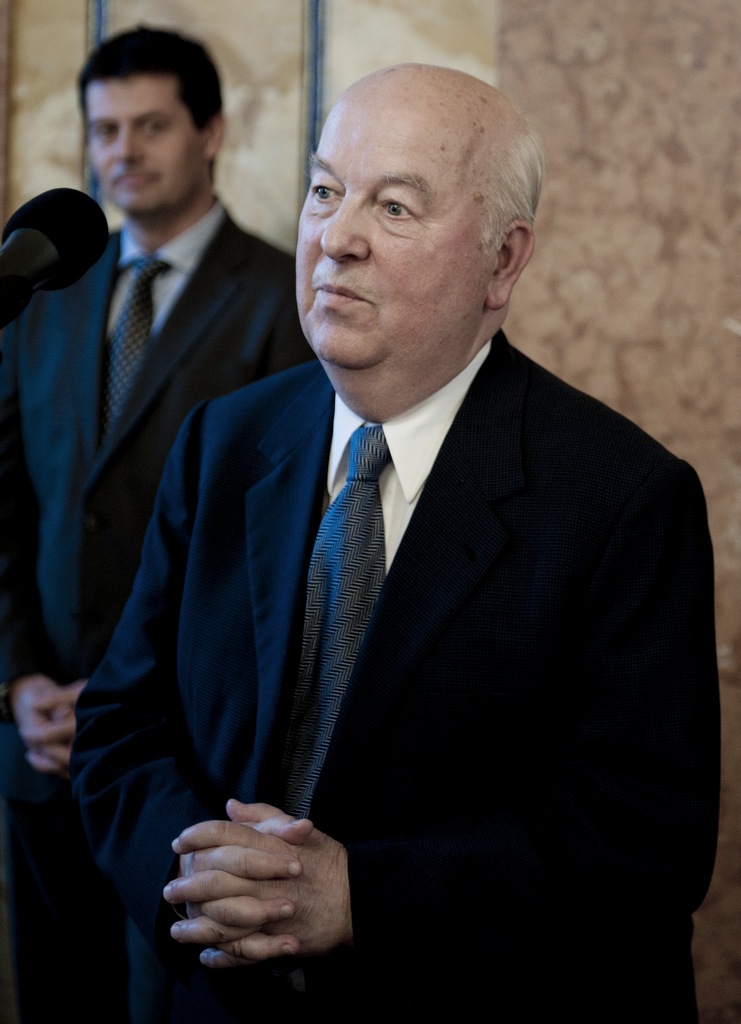
I’m particularly interested in pianists who are radically different to myself, the superb Czech pianist Ivan Moravec once declared in an interview. In that same interview, he also said “I will recall to my dying day two recitals given here in Prague by Michelangeli.” Those two sentences could be taken as a summary of Moravec’s approach to the piano and to music. Michelangeli was a great source of inspiration for Ivan Moravec: through not only the Prague recitals mentioned above, but also their personal encounters at Michelangeli’s master classes and the thorough study of his recordings. The pursuit of diametrically opposite approaches to the piano was something characteristic of Moravec’s constant refinement of his own original style. He also became the only Czech pianist included by the Philips Records label in its series Great Pianists of the 20th Century. Ivan Moravec began studying piano in Prague, which was also his birthplace. His first teacher was Ilona Štěpánová-Kurzová. It was opera, however, that first drew him to music, and he enjoyed listening to the recordings of Enrico Caruso. His career as a pianist was nearly ruined by an injury to is cervical spine, but he managed not only to overcome the handicap, but even to put it to use by developing his own special playing technique consisting in the use of the weight of his whole arm and the gentle creation of tones with the tips of his fingers. Despite his talent, Ivan Moravec had difficulty making a name for himself at home in Czechoslovakia, and it was his success in the United Kingdom and America that launched his worldwide career. His London debut came in 1962, and two years later – like the violinist Josef Suk and the pianist Rudolf Firkušný – he received an invitation from the conductor George Szell to make a guest appearance with the Cleveland Orchestra. In 1966 Moravec made his Carnegie Hall debut. In America he also began his systematic recording activities for the Connoisseur Society. Among Mr. Moravec’s best recordings are his 1982 recital of works by Claude Debussy for the Vox label and his recital of the music of Leoš Janáček for the Nonesuch label from the following year. The Supraphon label, which had formerly not wished to record him, finally awarded him with a platinum disc for 250,000 recordings sold. He was noted for his quiet, contemplative playing, and among his favourite composers were Mozart, Chopin, Schumann, Brahms, and Ravel. Antonín Dvořák is represented among Moravec’s recordings, naturally. He recorded Dvořák’s Piano Concerto in G Minor with the Czech Philharmonic and Jiří Bělohlávek, and with the mezzo-soprano Věra Soukupová he recorded the Biblical Songs. Ivan Moravec became a laureate of the Antonín Dvořák Prize in 2010. He was able to add this honour to a list including a Grand Prix du Disque, a Cannes Classical Award for lifetime achievement, and many other prizes.
Josef Suk (2009)
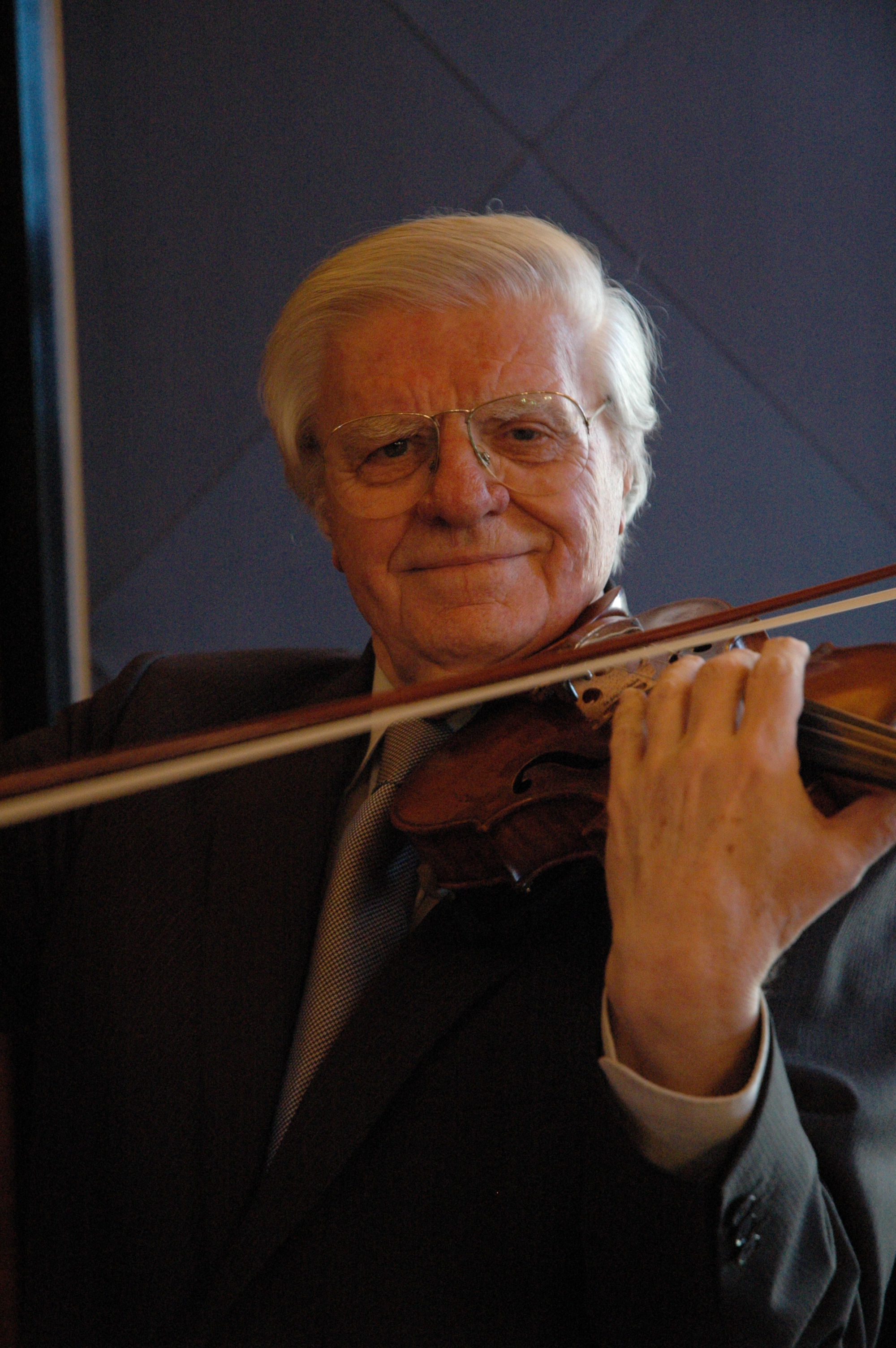
The-great grandson of Antonín Dvořák and the grandson of the composer Josef Suk, the violinist, violist, and conductor Josef Suk not only inherited a great deal of talent, but also developed it. He soon became a respected musician from a great line, and he never betrayed his talent or his name. “Josef Suk is universally acknowledged as the greatest living representative of the Czech violin school. His playing possesses an individual character with an immediately recognisable tone that has placed him among top international artists.” The music critic Patrick Lambert wrote these words of appreciation about Josef Suk in the journal Gramophone in an article that appeared in August 2004, when Josef Suk was seventy-five years old. Five years later, he celebrated his eightieth birthday and became the first laureate of the Antonín Dvořák Prize. That, of course, was not the first prize he ever received: in 2002 he became a knight of France’s Legion of Honour, and three years earlier the Czech president Václav Havel had conferred on him the Medal of Merit. From 1977 he held the title of National Artist. Above all, it was music that dazzled the world in Suk’s hands. “I admired him greatly,” Lambert continued in his confession. “It was he who introduced me to the world of great violinists with the highest violin culture. He was a colleague of Kubelík, Kreisler and Heifetz, and their recordings were for me at that time my daily bread.” For Josef Suk, music was his daily bread, and he was incapable of interpretations of anything but the highest quality. He was the last pupil of the violin virtuoso Jaroslav Kocián, who in turn had studied under Otakar Ševčík. Suk was not only a continuation of the line of a great composer, but also a successor to the greatest masters of the Czech school of violin playing. He played a Stradivarius, but he also played an instrument built by the Czech violin maker Přemysl Špidlen. The conductor George Szell invited the twenty-five-year-old Josef Suk to the USA – that is greater proof of talent and quality than all of his musical awards. It was not easy to satisfy the nearly superhuman demands that Szell made on musicians. It was with Szell and the Cleveland Orchestra that Josef Suk launched his international career. Josef Suk excelled as a soloist and a performer of chamber music. Naturally, he devoted himself to the music of his great-grandfather Antonín Dvořák and of his grandfather Josef Suk, but he was also an exemplary interpreter of Bach, Mozart, and Beethoven. Suk’s playing was characterised by a full, singing tone and perfect stylistic purity.